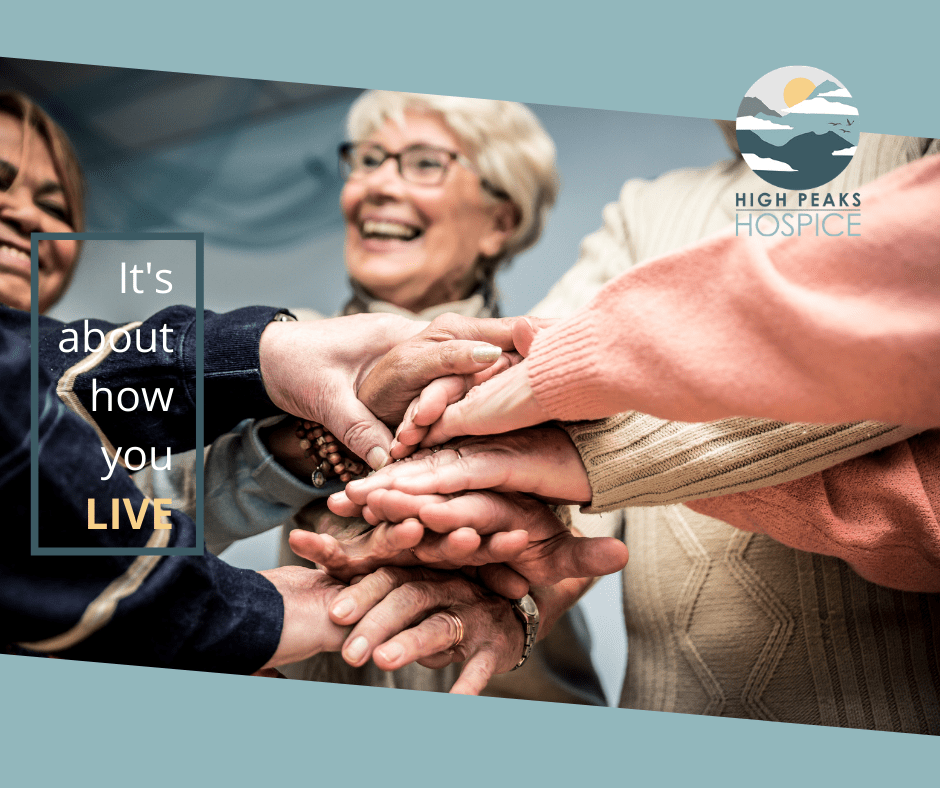Hospice in there for the whole family.
Dealing with a loved one that has a life limiting illness can cause a lot of stress on a family. How does Hospice help my family? What most families do not know is that when the patient receives hospice care; comprehensive care is also offered to the entire family. Hospice allows patients to remain home where they are most comfortable, and helps the patient feel relief from symptoms. Hospice is also there to provide support and education to the family. High Peaks Hospice takes a wholistic, whole family approach in end of life care.
A Hospice Team
It begins with nurses and aides. They are there to answer questions and give the family instructions on how to administer medications and use any medical equipment that may be required. Aides also help the family by providing much needed breaks from daily needs.
Caring for a loved one can lead to burnout. Having a team to help family members take breaks, have someone to lean on for help and being able to step away from caregiving is important for the whole family. Family members may be so focused on caring for their loved one’s needs that they forget to take care of themselves. It’s important that family members take care of themselves physically, emotionally and spiritually.
Hospice Care is provided by an interdisciplinary team of professionals and volunteers who are specially trained to address the needs of individuals living with advanced illness and their families. To assure the best possible care, the individual clinical teams meet daily in their offices and the entire interdisciplinary team (see below) meets every 14 days.
The team consists of:
- Physicians – your primary care physician and the hospice Medical Director work with the team to ensure that medical needs are met.
- Nurses – hospice nurses visit regularly to listen, assess and teach. They often act as the “eyes and ears” for the physicians – decreasing the need for undesired trips to doctors. They bring a wealth of professional and practical experience that can be useful in finding solutions to problems and ideas for better quality of life.
- Social Workers – the hospice social worker visits and calls to listen, assess and teach. Their expertise and experience is enormously helpful to individuals and families coping with the many social, emotional and financial issues related to advanced illness and its interaction with life in general.
- Chaplain – the hospice chaplain visits and calls to listen, comfort and provide counsel when needed. The chaplain works with individuals and families who have a religious connection, identify themselves as spiritual persons or who have no considered religious connection.
- Hospice Aides provide personal care, assistance with activities and meals, and other care activities to supplement what families and caregivers are able to provide.
- Care Volunteers – care volunteers are fully trained community members who generously give their time and energy to serve hospice patients and their loved ones in a variety of ways. They may include companioning, reading, talking, respite coverage for families and a variety of other tasks depending on the need.
- Others -when appropriate, additional professional and volunteer members may be involved. These might include a physical therapist, if their work could improve quality of life, a pet therapy visit from a loving therapy dog or a visit from our Chrysalis Singers. Social workers ensure everyone’s psychological needs are met. They can provide counseling, emotional support and help navigate through paperwork and other duties that are a part of the end of life journey.
Hospice Volunteers
Volunteer managers coordinate our hospice volunteers to assist the patient and family in any way needed. From cooking meals, to providing companionship to assisting with household tasks. Family members a well-deserved break by hospice volunteers so they can take care of their own needs: run errands, take a hot shower, even briefly travel without worry.
Education is important during this time. Family members may not be aware of the symptoms that can come about and the demand that places on them. Our workers can help prepare family members for what may come down the road and so the family may deal with it.
Support from hospice does not end when a patient passes away. A bereavement coordinator is there to help families work through the grieving process and find peace with individual and group support.

